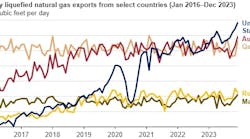Government bureaucracy and high taxes are putting petroleum industry development at risk, says the president of Calgary-based Alberta Energy Co. Ltd.
Speaking at the Summa Forum on Natural Resources in Ottawa Monday, Gwyn Morgan said Canada�s petroleum industry is becoming globally competitive and needs significant capital. �The issues causing greatest concern throughout our industry involve access�access to resources, access to markets, and access to capital.
These three issues come under the umbrella theme of competitiveness, said Morgan. "In a global economy, Canadian industry must not be at a disadvantage to our international competitors."
Resources
A growing problem for the Canadian oil industry is access to resources. Using Alberta as an example, Morgan noted that only about 20% of the province's land area appears relatively open to resource development. "And, of course, the open land is not necessarily where we are going to find gas or oil.
"Lands that are unavailable to industry, and areas of aboriginal interest where access is becoming increasingly difficult, shrink the resource base." Adding to this are other access restrictions, such as in wildlife areas and ecological reserves.
"These 'no-go' areas and [restricted-access areas]...create costly difficulties and delays," said Morgan. "And there are cases where industry has been retroactively denied access to resources that we have already paid for at government land sales.
"On top of this, we now face cash-hungry municipalities that are charging incremental permitting fees and seismic fees and camp allowances. It is not just the cost that's the issue; it is the addition of another layer of review."
Morgan says it is necessary that governments work with industry to find a way to honor existing commitments and compensate companies for their investments in areas where industry's operations are curtailed. "This is particularly the case involving a number of federal initiatives that may limit access to oil and gas resources across the country. These include Species at Risk legislation, the Canadian Environmental Assessment Act review, climate change, and buffer zones around national parks."
And many claims disputes with aboriginal groups have not been resolved, he said.
"The federal government and the provinces need to immediately concentrate on solving these issues. It is critical to clearly establish the specific roles and responsibilities of all stakeholders involved in aboriginal relations. It's not fair to stand back and let our industry be caught in the middle.
"Our access to resources is also being compromised throughout Canada by a lack of consolidated policy and integrated regulatory frameworks, including overlaps and inconsistency between federal and provincial authorities," Morgan added. "Unnecessary and costly roadblocks are threatening our competitiveness."
Markets
In addition to blocking industry's access to resources, said Morgan, "The twisted nightmare of rules and regulations we confront on a daily basis also stands between our industry and its markets.
"There are huge, hungry natural gas markets in Canada and the United States," he said. "And we look forward to new opportunities as demand in Canadian and US markets grows."
If Canadian producers have access to resources and access to these markets, says Morgan, Canadian companies can meet burgeoning Canadian and US gas demand.
"Canada has the supply potential, and new pipeline additions such as Alliance can move the product. To realize this opportunity, we need to expand exploration not only in the western provinces but also in the north and the East Coast."
Proposals have been put forth to transport natural gas from the Mackenzie Valley and the Beaufort Sea, he noted.
"This is a huge project with the potential to deliver jobs and benefits to Canadian northerners, and elsewhere in Canada, along with very important export revenue. But the last time this idea was proposed, it drowned in factional fighting and endless process.
"It's not often projects get a second chance," Morgan said. "We'd better not blow it this time."
Capital
But despite ample resources and proximity to flourishing markets, Canada�s capital markets are simply too shallow to fund major development needs.
�Canada�s domestic financial markets are simply too small to support growing global competition in the oil and gas business,� said Morgan. In 1996, the Canadian oil and gas industry raised more than $4 billion (Can.) in new equity financing, said Morgan. That fell by nearly $1 billion in 1997. And for the past 2 years, only $2 billion/year has been raised.
Canada's capital market is the ninth largest among western industrialized countries. Canada trails Italy, the Netherlands, Switzerland, France, Germany, Japan, the UK, and, of course, the US, which accounts for 57% of global capital, compared with Canada's 1.4%.
The AEC executive also said the heavy tax load borne by Canadians is eroding individuals' ability to invest.
"In order to retain our Canadian investors and attract international investors, we need fair, consistent, competitive government policies," said Morgan.
"When investors get the idea that governments are deliberately making it difficult for an industry, they look for other places to invest. Let's look at one huge example," said Morgan.
"Many Canadians believe that the most recent federal budget included plans to gradually reduce the federal corporate tax rate from 28% to 21% over a 5-year period. Well, not for our industry. Tucked away in the fine print was a qualifier saying that resource companies will not be eligible for the reduction being extended to everyone else. Every industry we compete for capital with has been given an advantage over us."
On the bright side, said Morgan, international investors are becoming more willing to consider the merits and potential of the strongest Canadian companies compared with their US competitors.

